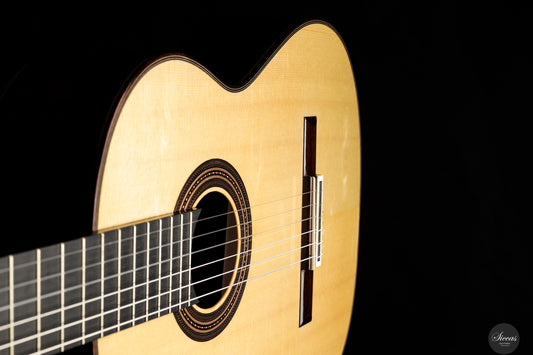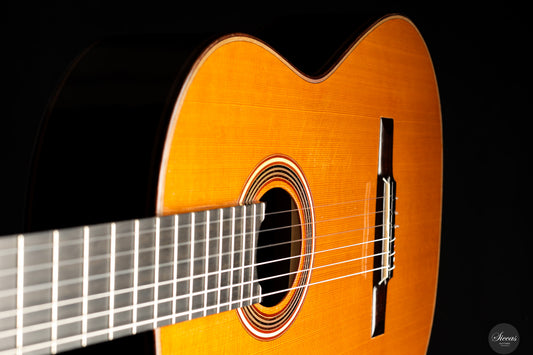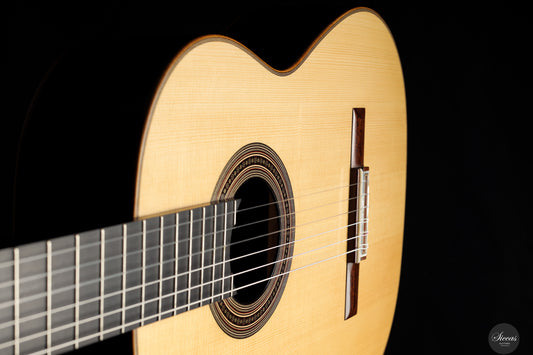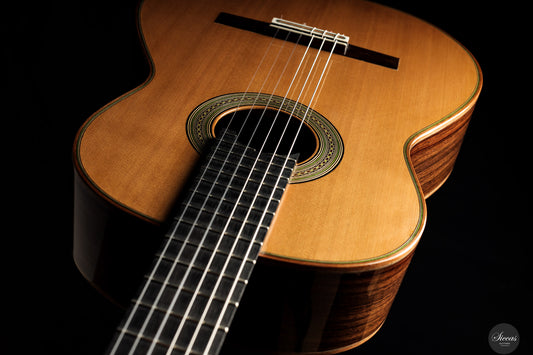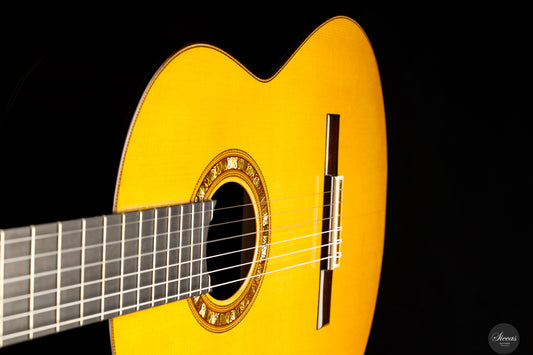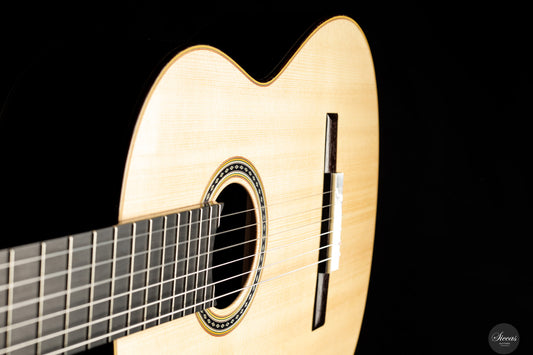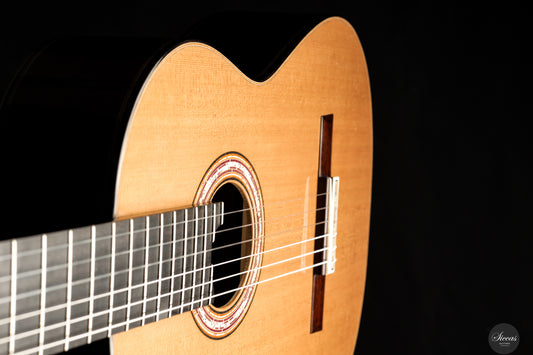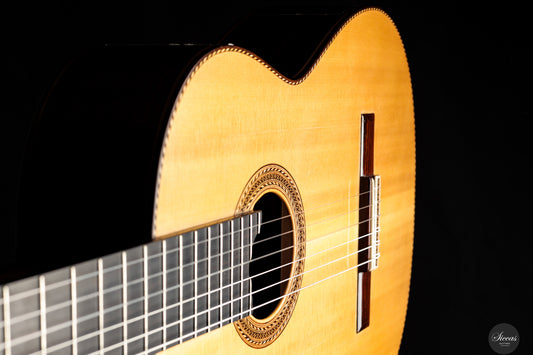
10 Must-Haves for Every Classical Guitarist’s Toolkit: Essentials for Sound, Maintenance, and Performance
Introduction: Every classical guitarist knows that achieving a great sound and maintaining their instrument requires more than just skill—it also takes the right tools and accessories. From keeping your guitar in top condition to enhancing your playing experience, a well-equipped toolkit can make all the difference. In this guide, we'll cover 10 essential items every classical guitarist should have, whether you're a beginner or a seasoned pro. These tools will not only help you sound your best but also protect your investment and keep your guitar performance-ready.
1. High-Quality Guitar Case
A quality case is essential for protecting your classical guitar from dust, humidity, and accidental bumps. A hard-shell case provides the best protection, especially for travel, while padded gig bags are great for light, everyday use.
Types of Cases:
- Hard Case: Offers superior protection, particularly useful for travel.
- Soft Case/Gig Bag: Lightweight and easy to carry, ideal for local gigs and practice sessions.
Tip: Look for a case with a secure fit and an interior that supports the neck, which helps prevent damage during transport.
2. Tuner
Accurate tuning is crucial for achieving the classical guitar's signature warm, resonant sound. A reliable tuner ensures your guitar stays in tune, especially when playing pieces that demand pitch precision.
Popular Options:
- Clip-On Tuner: Clips to the headstock and detects vibrations for accurate tuning.
- App-Based Tuner: Convenient for quick tuning using a smartphone.
Tip: Choose a chromatic tuner that works well with the lower tension of nylon strings, as classical guitars may require more subtle adjustments than steel-string guitars.
3. Footstool or Guitar Support
Classical guitarists often use a footstool or support to achieve proper posture and hand positioning. A footstool elevates one leg, helping to balance the guitar and provide stability, while guitar supports attach directly to the guitar for an ergonomic playing position without lifting your foot.
Types of Supports:
- Adjustable Footstool: Allows for different height settings to suit your posture.
- Guitar Support: Provides height adjustment and comfort without needing to lift your foot, which some players find reduces strain.
Tip: Experiment with both options to see which one feels most comfortable and supports your playing technique.
4. Nylon Strings
A set of quality nylon strings is essential for any classical guitarist, as they shape the instrument's tone and feel. Strings come in different tensions (low, medium, high), each suited to different playing styles and preferences.
Choosing the Right Strings:
- Low Tension: Softer feel, less volume—good for beginners or delicate fingerstyle.
- Medium Tension: Balanced, versatile for most styles.
- High Tension: More volume and projection, suitable for advanced players who want a more powerful sound.
Tip: Replace strings every 2-3 months (or sooner if you play often) to maintain a clear, vibrant tone.
5. Humidifier
Classical guitars are sensitive to changes in humidity, which can lead to wood warping or cracking. A guitar humidifier helps maintain stable humidity levels, especially during dry winter months or in dry climates.
Types of Humidifiers:
- Soundhole Humidifier: Inserts into the soundhole to protect the guitar's body.
- Case Humidifier: Placed inside the case, providing overall moisture control.
Tip: Aim for a humidity level of 40-60% to keep your guitar in optimal condition. Use a hygrometer to monitor humidity levels.
6. Nail Care Kit
Classical guitarists often use their nails to pluck the strings, creating a clean, articulate tone. A nail care kit helps you maintain the length, shape, and smoothness of your nails, which is crucial for consistent sound quality.
Essential Tools in a Nail Kit:
- Nail File and Buffer: For shaping and smoothing edges.
- Nail Clippers: To keep nails at a comfortable length.
- Clear Nail Hardener: Strengthens nails and prevents chipping or breaking.
Tip: Experiment with nail length and shape to find what works best for your tone and playing style. Aim for a slightly rounded edge to avoid snagging on strings.
7. Music Stand
A sturdy, adjustable music stand is essential for practicing and performing, allowing you to read sheet music comfortably without straining your neck. Choose a stand that's stable enough to hold multiple pages or heavier music books.
Types of Music Stands:
- Portable Foldable Stand: Lightweight, easy to carry, ideal for gigs.
- Heavy-Duty Stand: Offers more stability for home practice, especially for larger music books.
Tip: Make sure the stand height is adjustable so that you can maintain proper posture while reading music.
8. Metronome
Rhythm is critical in classical guitar playing, and a metronome helps develop timing and precision. Practicing with a metronome can improve your rhythm, making it easier to play complex pieces accurately.
Metronome Options:
- Digital Metronome: Offers adjustable tempo settings and sometimes built-in tuning functions.
- App-Based Metronome: A convenient option for quick practice sessions.
Tip: Start slowly and gradually increase the tempo as you master each section of a piece. Practicing with a metronome trains your sense of timing and control.
9. Sheet Music and Practice Journal
Sheet music is essential for expanding your repertoire, while a practice journal helps track your progress, goals, and challenges. Keeping organized records can make your practice sessions more effective and productive.
Why They're Important:
- Sheet Music: Allows you to learn new pieces, practice sight-reading, and deepen your musical knowledge.
- Practice Journal: Records goals, practice notes, and improvements, helping you stay focused and motivated.
Tip: Consider using a binder to organize sheet music and keep a small notebook or digital document for practice notes and reflections.
10. Polishing Cloth and Guitar Cleaner
A clean guitar looks and sounds better. Dust and grime can accumulate on the fretboard and body, affecting both appearance and sound quality. A microfiber polishing cloth and gentle guitar cleaner help maintain the guitar's finish without damaging it.
Cleaning Essentials:
- Polishing Cloth: Removes dust and oils without scratching the finish.
- Guitar Cleaner: Designed for the body and fretboard, preserving wood and maintaining shine.
Tip: Wipe down your guitar after each practice session to prevent sweat and oils from building up on the strings and wood. Regular cleaning helps keep your instrument looking and sounding its best.
Conclusion
A well-prepared toolkit is essential for any classical guitarist, covering everything from tuning and posture to maintenance and rhythm. Each of these 10 must-have items plays a key role in enhancing your playing experience, maintaining your guitar, and supporting your musical growth. Investing in these essentials will not only keep your instrument in top shape but also enable you to practice more effectively and perform with confidence. So gather your tools, and enjoy the journey of making beautiful music on your classical guitar!



